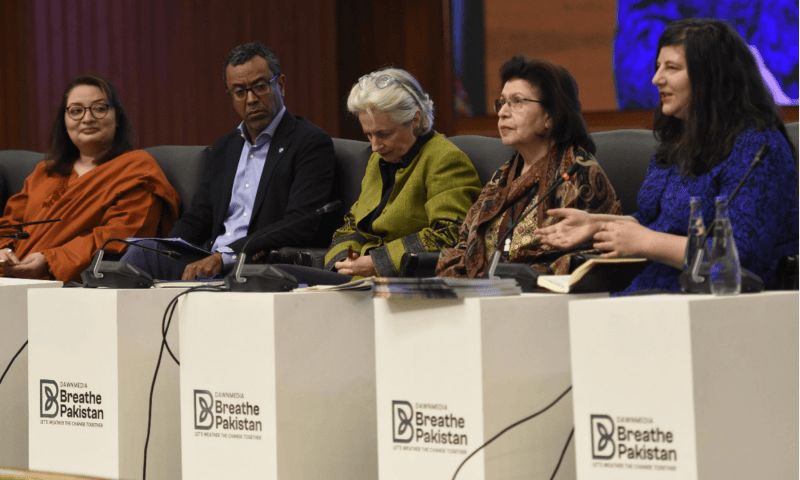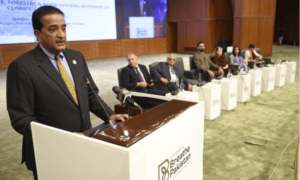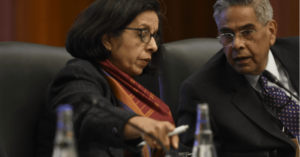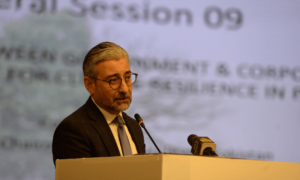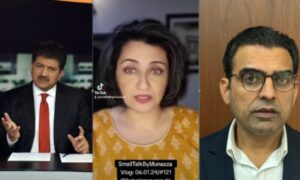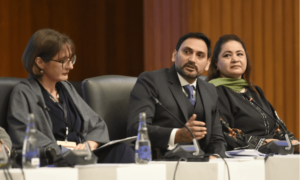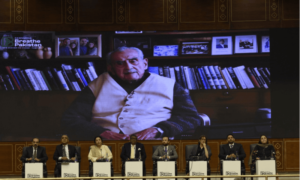Planning Minister Ahsan Iqbal suggests global environmental tax on the polluters.
The second and final day of DawnMedia’s ‘Breathe Pakistan’ global climate conference has begun on Friday, bringing together experts and leaders to find solutions to climate change with them calling for urgent funding to power adaptation initiatives to respond to threats posed by changing environmental and climatic conditions.
The moot aims to make Pakistan climate-resilient by 2047 while fostering regional cooperation across South Asia, where countries face shared challenges of rising temperatures, water scarcity and increasing natural disasters.
10:40am — Break
The conference is currently on a break, stay tuned for more live updates.
10:27am — Abdullah Fadil says mobilising young people crucial in fight against climate change
The Unicef Representative in Pakistan questioned how best to utilise social media to mobilise young people in the fight against climate change. He highlighted the need to take concrete action to make an impact in Pakistan, especially through community and grassroots initiatives.
“Educating young people and making sure school curriculums include how to protect the climate and have ownership of this issue is crucial,” the Unicef representative said.
He emphasised the need to establish a “national volunteer court” focusing on young people aged 15 to 24, that could mobilise millions of young people to work through the Indus River in terms of restoration and cleaning.
Speaking about broader solutions, he said, “How do we get out of this conference and mobilise these millions of young people, particularly those who are not in education and training? But also for those who are in education and training, how do we combine all of this energy and resources to make an impact in Pakistan? That is, I think, a call to action.”
10:20am — Florence Rolle highlights importance of restoring Indus Basin
The FAO representative in Pakistan spoke on the importance of the Indus ecosystem, calling the Punjab government’s efforts the “engine” for the global and national push for rehabilitating and restoring the Indus basin.
“The focus today for the Indus Basin is about restoration; It’s not only about protection of the whole ecosystem,” she said. “You need to harness the creativity, energy and mobilisation of people” urging the need for “citizenship-led development”.
10:14am — Aban Marker Kabraji speaks on Living Indus
The project began from the call by the UN Secretary General on the triple planetary crisis; the crisis of climate change, biodiversity loss and pollution. She noted the need to focus on the source of sustenance in Pakistan — water.
Kabraji went on to say that since we live in an “extremely unpredictable situation”, we must plan within the context of unpredictability, calling the Living Indus programme Pakistan’s adaptation plan for the future.
9:58am — Romina Khurshid Alam welcomes Zunaira Qayyum Baloch
The Coordinator to the Prime Minister on Climate Change noted that Pakistan stands at a defining moment in its climate journey. “As a country on the frontline of climate change, we face mounting challenges, extreme weather patterns, water scarcity and environmental degradation.”
However, Pakistan is not defined by these challenges alone, she went on to say. “We are defined by our resilience and our ability to overcome adversity,” she said. “We are not merely passive victims of climate change, we are active participants in foraging solutions.”
She highlighted that this was a question of justice; “Pakistan is paying the price of something created by others”. Alam added that the devastating loss of life and critical infrastructure in the recent floods is all the more reason that Pakistan must leave no stone unturned in its effort to rescue, rehabilitate and rebuild.
9:32am — Senior minister Marriyum Aurangzeb speaks on Punjab’s first climate resilience policy
The senior minister has dedicated her keynote address to speaking about the Punjab climate experience over the past 12 months. “We had to take a comprehensive, holistic, integrated, multisectoral approach towards climate resilience across Punjab,” she said while addressing severe floods, heatwaves, hazardous air quality and water shortages in South Punjab.
Punjab has formulated its first climate resilience policy through the lens of adaptation and mitigation, with climate justice being central to the policy. A total of Rs10 billion has been allocated to smog mitigation, while Rs100bn has been allocated to climate resilience projects across Punjab.
While noting that climate change transcends borders, Aurangzeb unveiled that Pakistan has begun its dialogue with India and written a letter to the foreign ministry to initiate dialogue with countries in the region that have a direct impact on the air quality.
9:27am — Planning, Development & Special Initiatives For Pakistan Ahsan Iqbal
The planning minister suggested that the United Nations create some form of a global environmental tax for polluters, and from that tax, the money should be used as a fund to help countries in the Global South meet the challenges of climate change.
Day one of the moot began at 10am and concluded past 6pm at Islamabad’s Jinnah Convention Centre after a marathon session of discussions, keynote addresses, and speeches by various experts and dignitaries elaborating on issues, challenges, opportunities and solutions related to climate change and pollution.
Speakers
The conference will have a roundtable to inspire dialogue between the government and the corporate sector and explore sustainable public-private partnerships, which will be attended by Deputy Prime Minister Ishaq Dar and Planning Minister Ahsan Iqbal, among others.
A session on agriculture, forestry, and food systems in climate change will be attended by agriculture and forestry experts at which Food and Agriculture Organisation (FAO) Representative Florence Rolle, Climate Change Ministry Secretary Aisha Humera Chaudhry, and former climate change minister Malik Amin Aslam will speak.
In the concluding session of the conference today (February 7), former prime minister and Senate Chairman Yousaf Raza Gilani will address the audience.
Other speakers include climate expert Ali Tauqeer Sheikh, British High Commissioner Jane Marriott, Petroleum Minister Senator Musadik Malik, climate activist Karishma Ali, and youth activist Zunaira Qayyum Baloch, among others.
- Desk Reporthttps://foresightmags.com/author/admin/

